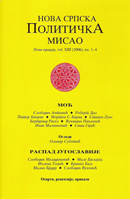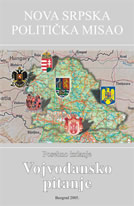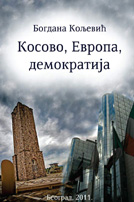| NSPM in English | |||
“Russian” streets – Serbian disgrace |
 |
 |
 |
| понедељак, 19. октобар 2009. | |
|
Of course, I am talking about the Serbian national football team, which played their best match in the last few decades and triumphantly qualified for the world championship in South Africa. However, as we can see, this formula is of universal value. Unfortunately, it is still far from being applicable to matches that the Serbian team plays in the fields of politics and economy. All in all, I admit that I am a little scared by the idea that our boys have not been better since Ivica Osim was manager and since the time of the “rump” but impressive team from the early 1990s, which was not allowed to compete and most likely to win the European Championship in Sweden due to political reasons. And we all know what happened later. But let’s get back to the Serbian political arena, where lousy matches are played, and even when someone scores a point or many of them, the effects are quickly wasted and dwindle away to nothing after many beginners’ mistakes, unnecessary dribbling, own goals and quarrels about merits. The examples are numerous, and we will therefore describe the most recent and most striking one. Having in mind its size, problems, heritage and neighboring countries, it is not easy for a state like Serbia to pursue a more or less independent foreign policy and make a go of it. Within only a year Serbia scored important points: in the UN General Assembly, by preventing and slowing down the recognition of Kosovo, by implementing the Gas Agreement with Russia; diplomatic relations with the US were normalized within possible limits; forgotten perspectives regarding partnership with the Non-Aligned Movement were rediscovered and Serbia became significantly open towards China, which was virtually erased from the political agenda by the post-5th October leaders and “experts”. There are not many countries or governments which can take pride in the fact they hosted both the Vice-President of the US and President of Russia and whose leaders were in the meantime received by top officials in Beijing, the capital of China, and as it seems, the capital of the 21st century. Of course, these points are still to be discussed and there can still be obstacles. It is certain that the opposition parties, as well as some which belong to the coalition in power, are entitled to view these facts from a different perspective. However, nobody who cares about Serbia and who wants to be objective, can deny that the aforementioned success of foreign policy is at least encouraging, if not impressive, and that it, at least conditionally, deserves general support. And what have we done so far? The very successful visit of high-ranking state officials to China remained in the shadow of the local fuss about the Media Law and nobody remembers it anymore. Pro-Western and quasi-liberal Serbian public sneered at a step toward the Non-Aligned Movement and greeted it with virtually racist prejudice. And the upcoming visit of Russian President Medvedev is very likely to turn into a scandal due to the fact that some Belgrade streets which were named after Soviet World War 2 leaders were renamed, and there were tendentious articles in Belgrade papers about the details of the protocol and the expenses of his visit (Why isn’t he spending the night in Belgrade? How many trumpeters and guests will be there? Who is going to pay for it?) I appreciate openness and second all measures toward saving money from the budget. However, I do not recall that I read in Serbian papers any articles about the cost of security and organization of Vice President Biden’s visit. There are still three streets in Belgrade named after American presidents, whose names do not bother anybody and it never occurred to anyone to rename them, even when American bombs were falling on Serbian towns and streets. But who on earth came up with the idea that Belgrade streets should not be named after Soviet/Russian generals and marshals who liberated Belgrade and Serbia? What were the people who decided to rename these streets, who voted in favor of that decision and those who allowed it thinking of? How much vehement anti-communism, stupid vengefulness and sycophancy did it take to do something like that?! And it happened when entire Europe is frantic about gas and deliberating which attitude to take toward the renewed power and influence of Russia. It happened at the same time when Europe is commemorating the jubilee of anti-fascist struggle. And there would have been no struggle and victory without the glorious Soviet (Russian) arms and countless victims, whether you like it or not. Since everything here comes later than in the rest of the world, our intellectual and political elites have recently started to equate “left” and “right” totalitarianism, which was present among some Western political scientists during the peak of the Cold War, i.e. during the 1940s and 1950s, and in the early 1990s in Eastern Europe. Regardless of whether we are look at it from the local perspective or the global one, the victory over fascism cannot simply be washed out and do without the Russian (Soviet) seal and blood, even though some people may be unwilling to hear it. Not that we should not talk about the good and the bad sides of Soviet “real socialism”, which also applies to “real capitalism”. These debates, including the one on what has been happening in Belgrade and Serbia in the months and years after October 1944 should be an open and fair one. It should be so for the sake of the future, rather than for she sake of truth about our controversial past. (By the way, we could learn about this from Russia). But regardless of the course and possible outcome of this necessary internal debate, we owe an apology to the President of Russia and to the descendants of Red Army soldiers who died in combat to liberate Belgrade. And we owe them this apology not only because of the street names scandal. |
Остали чланци у рубрици
- Playing With Fire in Ukraine
- Kosovo as a res extra commercium and the alchemy of colonization
- The Balkans XX years after NATO aggression: the case of the Republic of Srpska – past, present and future
- Из архиве - Remarks Before the Foreign Affairs Committee of the European Parliament
- Dysfunction in the Balkans - Can the Post-Yugoslav Settlement Survive?
- Serbia’s latest would-be savior is a modernizer, a strongman - or both
- Why the Ukraine Crisis Is the West’s Fault
- The Ghosts of World War I Circle over Ukraine
- Nato's action plan in Ukraine is right out of Dr Strangelove
- Why Yanukovych Said No to Europe

.jpg)








 So, this should be the formula. A real leader. Clear vision. Good and harmonious team. Patriotism which motivates one to push their limits. Belief in success. And, of course, just a little bit of luck.
So, this should be the formula. A real leader. Clear vision. Good and harmonious team. Patriotism which motivates one to push their limits. Belief in success. And, of course, just a little bit of luck.












